Schools in Singapore ramp up anti-vaping efforts through lessons, student ambassadors
Sign up now: Get tips on how to help your child succeed
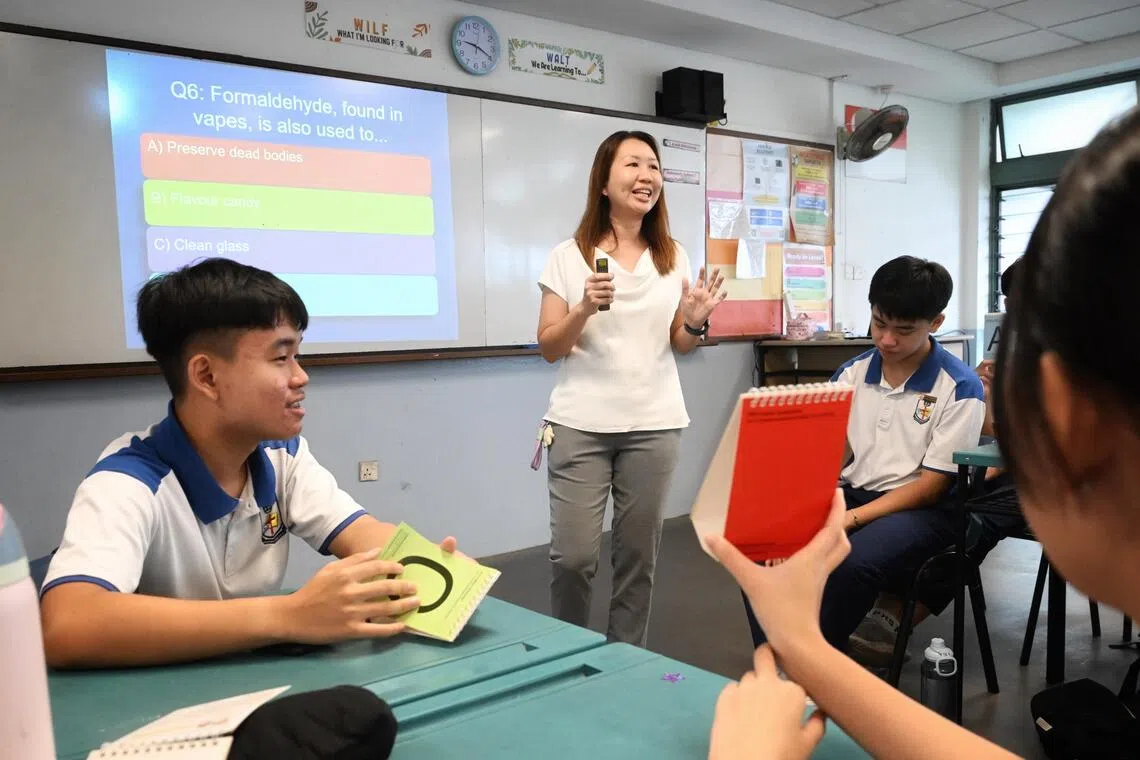
A teacher conducting a science lesson to illustrate the harmful effects of vaping at Presbyterian High School on Oct 22.
ST PHOTO: CHONG JUN LIANG
Follow topic:
- Singapore schools are intensifying anti-vaping education with packages including etomidate information, CCE lessons on resisting temptation, and training student leaders.
- Vaping offences increased sharply, with about 3,100 students caught annually between 2022 and 2024, prompting stricter measures and enforcement.
- Peer support is crucial; trained students are promoting vape-free lifestyles and offering support, as students may confide more in peers than teachers.
AI generated
SINGAPORE - All schools have received a science package with anti-vaping materials to be shared with students – including content about etomidate, a harmful substance found in many e-vaporisers – as part of the Ministry of Education’s (MOE) efforts to support the national anti-vaping drive.
Also, in Character and Citizenship Education (CCE) lessons, secondary school students will discuss the negative and long-term impacts of vaping, as a means to control their impulse to engage in risky behaviours such as smoking and vaping.
Student leaders have also been trained to encourage their peers to embrace a vape-free lifestyle.
The anti-vaping education efforts go hand in hand with stiffer measures against students caught for vaping offences, which Education Minister Desmond Lee announced on Aug 28 at a press conference regarding the whole-of-government commitment to tackle vaping
Between 2022 and 2024, about 3,100 students were caught for vaping offences
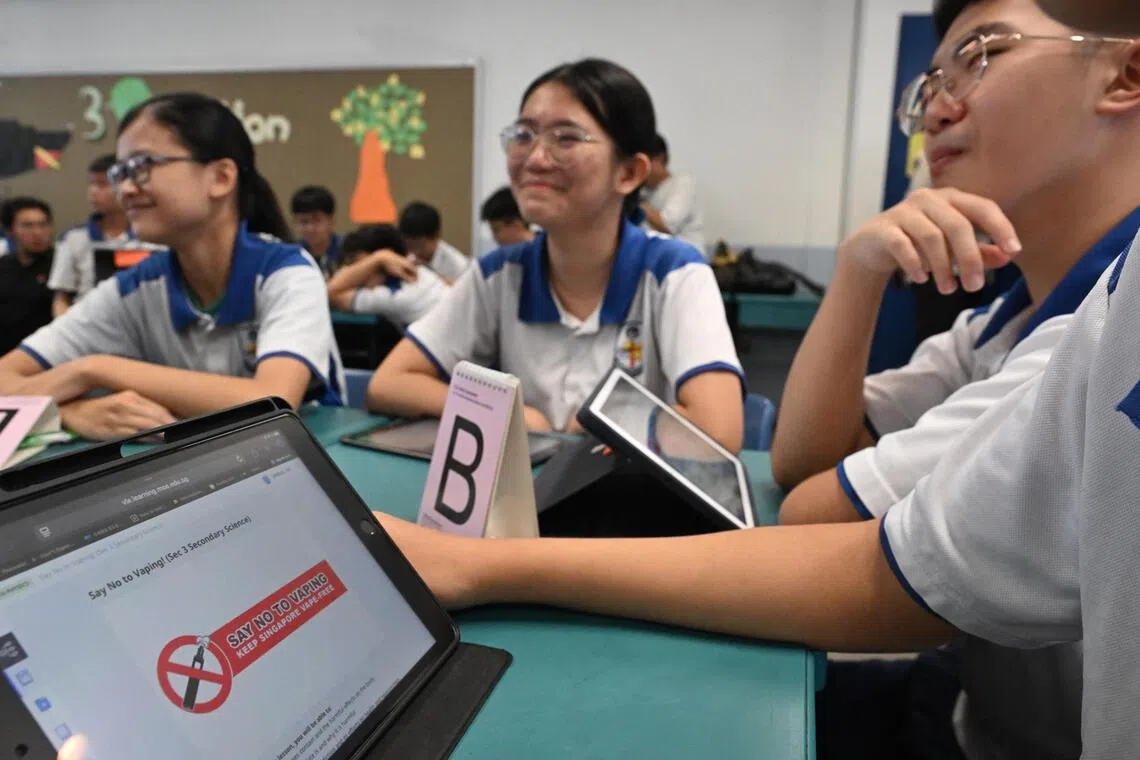
Presbyterian High School students learning about the harmful effects of vaping on Oct 22.
ST PHOTO: CHONG JUN LIANG
At the post-secondary level, around 800 students were caught annually across the Institute of Technical Education, five polytechnics and six autonomous universities.
This is a sharp rise from the fewer than 50 cases across schools and institutes of higher learning before 2020.
An MOE spokesman said the increase was due to intensified enforcement.
Sharing knowledge through science and CCE lessons
MOE said a science package with anti-vaping content was shared with all schools in September.
Apart from updated information about etomidate and its harmful effects on the body, the package also covers new content on the science behind addiction.
The ministry said this is to help students understand how vaping can lead to dependency, and to provide practical guidance to teach students to say no to vaping.
During a science lesson for Secondary 3 students at Presbyterian High School on Oct 22, the teacher discussed how vapes are addictive, and how etomidate is supposed to be used in medical situations to induce sedation.
Madam Heng Hui Peng, the school’s head of science, said these lessons are important to provide students with vaping facts to prevent the spread of misinformation, as students may rely on peer influence rather than seek accurate information.
“Some students think when you try vaping once it is okay, because they don’t know that it contains nicotine... which causes addiction.
“This is why it’s our role (as teachers) to address such a misconception,” she told The Straits Times.
Muhammad Harith Firas Ismael, one of Madam Heng’s Sec 3 students, said the science lessons made him aware of misconceptions he had about vaping.
“I used to think that vapes were just as bad as cigarettes... but in actual fact, they’re more harmful,” he said.
With the benefit of the lessons, he believes he is better able to educate and influence his peers about the ills of vaping.
“Now I know the stakes are a lot higher than I originally thought. And I will do everything I can to try and take care of them, and not let them vape,” he added.
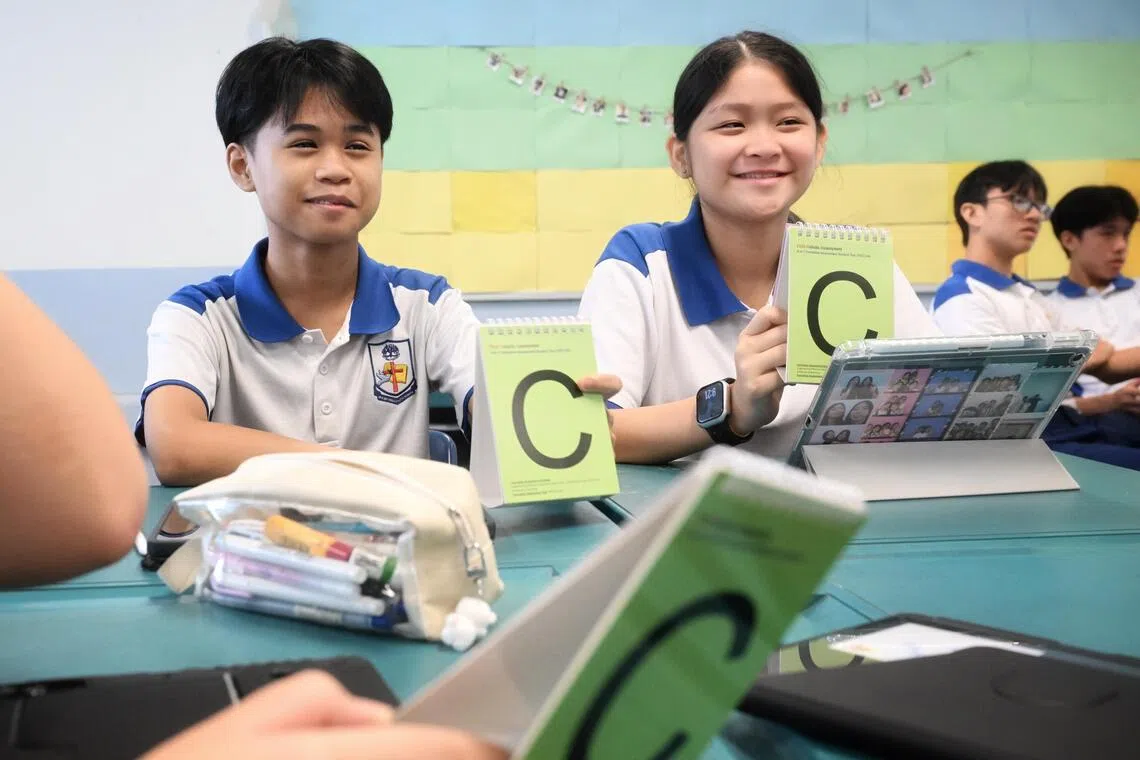
Muhammad Harith Firas Ismael (left) said the science lessons made him aware of misconceptions he had about vaping.
ST PHOTO: CHONG JUN LIANG
MOE said discussions during CCE lessons aim to develop moral reasoning in students by considering law and order, societal good and universal ethical principles.
Students also learn to apply social-emotional skills like problem-solving and self-control in scenarios involving risky behaviours, and reflect on how they can support friends who feel tempted to vape.
During a CCE lesson for Sec 3 students at Presbyterian High School on Oct 22 observed by ST, students discussed how they would react if they found themselves in difficult scenarios regarding vaping.
They also role-played how they would react when offered vapes.
Ms Hshieh Szu An, subject head of CCE at Presbyterian High School, said such activities help students learn authentically and equip them with skills to make wise decisions and cope with pressures related to vaping.
“When faced with a situation where they may be tempted (to vape)... they will know specifically the extent of the harm that they will face and how to make decisions from there,” she said.
Zoanne Sarah, another Sec 3 student at Presbyterian High, said she found the role-playing activities during CCE lessons with her classmates useful, as they allowed her to better understand and reflect on young people’s struggles with vaping.
“During the role-play, we can see how two different perspectives come together,” she said, adding that group discussions also helped students explore different ways to handle difficult situations, like when a family member asks you to hide their vapes.
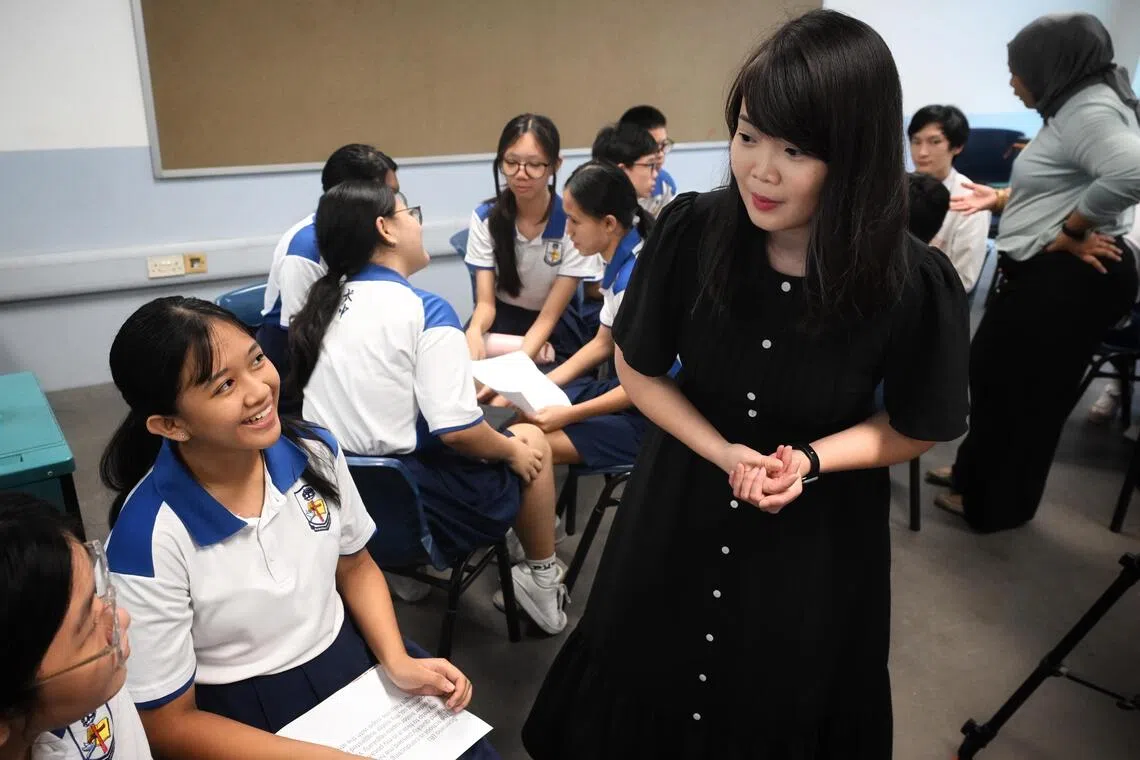
Sec 3 student Zoanne Sarah speaking to Ms Hshieh Szu An during a CCE class on Oct 22.
ST PHOTO: CHONG JUN LIANG
Peer support in the fight against vaping
In addition to MOE’s anti-vaping efforts, more than 250 students from 35 schools have been trained to promote a vape-free lifestyle among their peers.
They were trained under a Health Promotion Board (HPB) pilot programme launched in 2024 to equip student leaders in St John Brigade, Girls’ Brigade (GB) and National Cadet Corps (NCC) with skills to support their peers.
In their two-hour online training, the student leaders went through various topics, including Singapore’s regulatory approach towards nicotine products, and marketing strategies that vape companies use to target young people.
They also learnt project management and peer engagement skills, as well as how to provide support to those who want to quit vaping.
Mr Chen Ziyang, principal of Yusof Ishak Secondary School, told ST that the school’s GB and NCC cadets attended the HPB training session between May and August.
Since then, the NCC cadets have spoken about the health effects of vaping at morning assembly and created anti-vaping posters that will be displayed schoolwide, while the GB has set up a booth with interactive games designed to address common misconceptions about vaping.
“Students have responded positively to these peer-led initiatives, showing interest in learning more about the topic,” said Mr Chen.

Apart from the HPB programme, all schools have a peer support structure in place for bonding and helping one another and influencing the right behaviours, MOE said. Schools select and train students to be peer support leaders to strengthen the network of support in their classes, CCA or other groups.
“The peer-led approach is effective because students model positive behaviours for their peers, normalising help-seeking and inclusivity as part of school culture,” said Mr Chen.
Bosco Chan, a 14-year-old NCC cadet from Yusof Ishak Secondary, told ST that peer-to-peer support in schools is important as students may have a bigger impact on their peers than their teachers do.
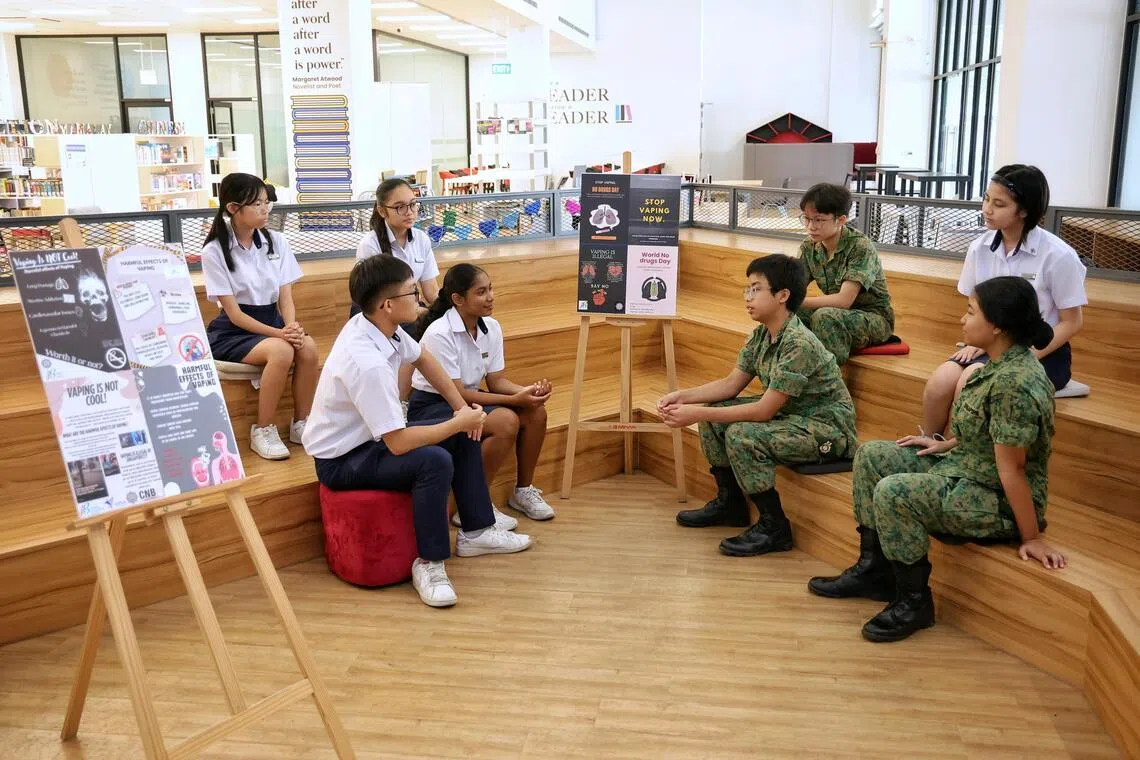
NCC cadet Bosco Chan (fourth from right) and a group of Yusof Ishak Secondary School students holding a discussion on Oct 22, 2025.
The Straits Times
“Students might find it easier to converse with their peers and confide about their struggles with vaping, rather than telling their teachers,” he said.
Correction note: This story has been edited for clarity.


